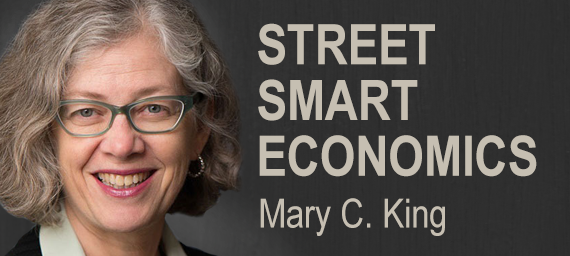This fall, we could vote for free, year-round, high quality preschool for all 3-, 4- and 5-year-olds in Multnomah County, paid for with a county income tax on households with annual incomes over $200,000. With this single program, we can start to:
• Give all our kids the start in life that they deserve;
• Raise high school graduation rates;
• Boost incomes locally, especially at the bottom;
• Make progress on class, race and gender justice;
• Help out young families struggling with high rent, child care and student debt bills; and
• Kick start the most effective economic development strategy we have.
Universal preschool for everybody works better than limited programs, builds community and should be the right of all our children.
Unlike programs intended only for low income families, universal programs pull us together as a community rather than dividing us by economic status. They’re more sustainable and better supported, as they engage politically empowered middle and upper middle-class parents. Research shows that all kids benefit from high quality preschool, and outcomes for kids from low-income families are better in universal programs.
Preschool is a proven two-generation anti-poverty program.
Providing preschool is the single best way to improve our low high school graduation rates, and avoid high rates of poverty, unemployment and low pay faced by people who don’t graduate. Preschool helps kids to thrive in kindergarten and the early grades, setting the foundation for all later learning. Local teachers say that the social and emotional development created by child-led, play-based preschool makes a dramatic difference.
With the chance to send their kids to a safe, nurturing, full-day preschool, parents can work more hours, advance at work or pursue more education and training. Now, young children are the poorest age group in Oregon, because many parents are unable to both care for them and earn enough to escape poverty.
Both children and parents will bring more skills to work, attracting businesses and creating a “spillover effect” of higher wages for the local labor force as a whole.
Paying preschool teachers living wages increases quality and helps push up local wages
The wage floor for preschool teachers and child care workers should be $18 an hour, or $36,000 a year. In Oregon preschool teachers and child care workers earn little more than the minimum wage, even with college degrees, and often have to rely on public benefits like food stamps.
Paying preschool teachers comparably with elementary school teachers retains experienced people who love the work but can’t afford to stay in the field. Now, quality is hurt by high staff turnover. Plus, higher salaries for any low-wage occupation puts pressure on all employers to pay better.
Free, universal public preschool contributes to economic, race and gender justice.
Public preschool programs for low income families serve only a fraction of eligible kids. But fulltime, private preschool programs cost as much as rent, making them unaffordable for the working families that need them most.
Families of color have less access to preschool than others, and should have the choice of culturally specific or culturally inclusive preschool settings. Women of color especially are overrepresented among preschool workers, and will gain from raising pay to a level that more accurately values the work they’re doing.
Women represent the vast majority of the preschool workforce, and provide the bulk of unpaid family care for children. Consequently, they are disproportionately likely to be poor throughout their lives. Most single parents are women, and they - as well as women with partners who are sick, injured or unemployed – struggle to give their families both the care and the income they need.
Fighting economic inequality at both ends.
The number of poor people in Multnomah County has grown almost twice as fast as the population over the last 30 years. Meanwhile, the number of Oregonians reporting $1 million in annual income grew faster than in any other state from 2010 to 2017. Geographically, the gap in average income between households east of 82nd and the rest of the city more than doubled from 2006 to 2018, according Christian Kaylor, an Oregon Employment Dept. economist.
The 1% alone captures 17% of income in our state, as seen in this chart from the Oregon Center for Public Policy. Not shown, but clear in the same data, is the criminal fact that our mismanaged economy provides the bottom one-fifth of Oregonians only 1.5% of state income, or one-sixty-sixth of the total.

We have the resources to create a model preschool program.
Many of us don’t realize how wealthy our region has become, because growth has been so concentrated at the top. The average income of the 3,680 households in Multnomah County’s 1% was $1.2 million in 2016, according to the Oregon Department of Revenue.
We can pay for universal preschool by reinstituting the Multnomah County Income Tax in a more progressive form, taxing the top one-twentieth of households.
The campaign for Universal Preschool NOW!
The Universal Preschool NOW! campaign (www.upnow2020.com) plans to bring a ballot measure to the polls in November 2020. Multnomah County could have free, year-round preschool in multiple languages and settings for all 3-, 4- and 5-year-olds whose parents want it, phased in over five years or so. Quality can be assured by paying living wages, providing professional development and requiring oversight by a Community Oversight Board comprised of a representative group of stakeholders.
Small enough to win locally, big enough to make a real difference!
Many big problems, like insufficient public housing, are best tackled at the national level, with federal income tax revenues capable of taking on high-priced projects. Other urgent issues, like funding our schools, have to be addressed by the state legislature.
But creating good preschool for all of our kids is something we can do in Multnomah County, with an electorate ready to support critical community projects. Multnomah County could have the best public preschool program in the country, and become a model for others to follow.


